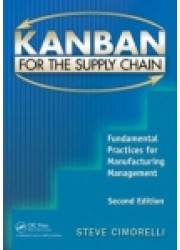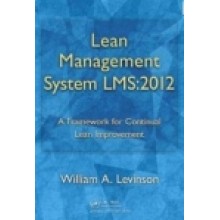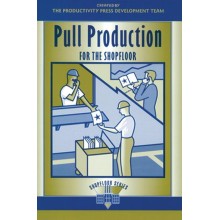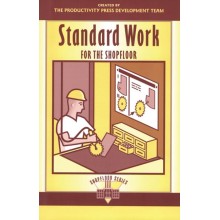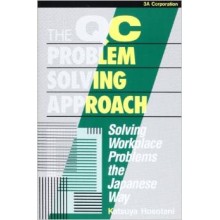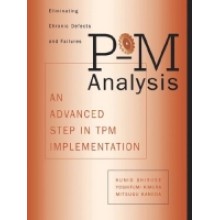Your shopping cart is empty!
Welcome visitor you can login or create an account
Kanban for the Supply Chain: Fundamental Practices for Manufacturing Management, 2nd Edtion
Publisher: PRODUCTIVITY PRESS
ISBN: 9781439895498
Author: Stephen Cimorelli
Dispatch Time: 2 - 3 Days
ISBN: 9781439895498
Author: Stephen Cimorelli
Dispatch Time: 2 - 3 Days
Our Price: £39.99
Quantity:
-
Add to Compare
Providing actionable steps for each stage in the manufacturing and supply chain management process, this book presents a detailed roadmap for implementing Kanban. This updated second edition focuses on creating an environment for success. Addressing both internal and external elements, it considers statistical data cleansing techniques to remove irrelevant data, correlation analysis using Excel-based techniques to guide decisions, the analysis of supplier performance against lead time and lot size expectations, and risk mitigation strategies for poor performing suppliers.
Features:
- Supplies step-by-step guidance on how to prepare for and implement Kanban
- Provides presentation materials, including key outlines, charts, and figures on the accompanying CD
- Describes calculations and analysis techniques that can be performed with Excel
- Covers data cleansing techniques, correlation analysis, stair-step analysis, and supplier performance
Contents
Overview of Kanban in a Lean Environment
What Kanban Does
Definitions: Building a Common Language
Building a Lean Environment
Takt Time
Backflushing
JIT Preparation for Kanban
Begin with 5S
Supply Chain Management Principles
Defining the Supply Chain
What Is Supply Chain Management (SCM)?
Applying the ABC Classification Applying ABC Classification Step-by-Step
The Sawtooth Diagram: Analyzing Inventory Behavior
Sawtooth Diagram Basics
Sawtooth Example: Analyzing the Behavior of a Part Number
Sawtooth Assumptions versus Reality
Analyzing Demand Pattern Variability
Potential Solutions for Covering Potential Stockouts
Lead Time and Lot Size Guidelines
Using the EOQ Formula
Fine-Tuning the EOQ
Establishing Carrying Cost
Setting Lot Size Guidelines
Managing Replenishment Lead Times
Determining Lead Time Objectives
Statistical Analysis 101 and Demand Variability
Customer Demand Variability
Using Z Scores
Recommended Formula
Optimizing Inventory for On-Time Delivery: The Case for Data Cleansing
How Much Safety Stock Is Enough?
Deciding Which Parts to Put on Kanban
Using Correlation Analysis to Guide Kanban Candidate Selection
A Simplified "Stair-Step" Approach
Sawtooth Exercises
Managing Kanban during Decreasing Demand
Recommend Actions for Adjusting to Decreasing Demand
Applying the Solution for Decreasing Demand
Further Lot Size Reduction Is Possible Using a Multicard Approach
Other Supply/Demand Issues
The Problem of Early Deliveries
Two Potential Actions for Early Delivery
The Problem of Late Deliveries
Physical Techniques of Kanban Replenishment Systems
Using Kanban’s Manual–Visual Control Techniques
Painted Squares on the Floor
Technique for Storing Single Card Parts
Technique for Storing Multicard Parts
Techniques to Identify the Order Point Inside the Bin
Information on the Kanban Card
Handling the Kanban Card
Options for Designating Permanent Locations
Kanban Management for Raw Materials
Challenges and Recommendations for Managing Raw Material
Employing a Ledger System for Managing Raw Materials
Cautions and Recommendations for Setting the Order Point
Kanban Maintenance
Kanban Adjustment Report and Card Maintenance
Supplier Performance Reports and Stockout/Expedite Tracking Report
Stockout and Expedite Tracking
Supplier Performance
Kanban Audits
Kanban Implementation
Roles and Responsibilities in Kanban Implementation
Using a Project Plan for Implementing Kanban
Stabilizing Production
Creating a Hybrid Push/Pull Model: Min/Max Stabilization Process
Calculating Min/Max Levels
Conclusion
What You Have Learned—What You Need to Practice
Next Steps
Final Word on Lean
Index
What Kanban Does
Definitions: Building a Common Language
Building a Lean Environment
Takt Time
Backflushing
JIT Preparation for Kanban
Begin with 5S
Supply Chain Management Principles
Defining the Supply Chain
What Is Supply Chain Management (SCM)?
Applying the ABC Classification Applying ABC Classification Step-by-Step
The Sawtooth Diagram: Analyzing Inventory Behavior
Sawtooth Diagram Basics
Sawtooth Example: Analyzing the Behavior of a Part Number
Sawtooth Assumptions versus Reality
Analyzing Demand Pattern Variability
Potential Solutions for Covering Potential Stockouts
Lead Time and Lot Size Guidelines
Using the EOQ Formula
Fine-Tuning the EOQ
Establishing Carrying Cost
Setting Lot Size Guidelines
Managing Replenishment Lead Times
Determining Lead Time Objectives
Statistical Analysis 101 and Demand Variability
Customer Demand Variability
Using Z Scores
Recommended Formula
Optimizing Inventory for On-Time Delivery: The Case for Data Cleansing
How Much Safety Stock Is Enough?
Deciding Which Parts to Put on Kanban
Using Correlation Analysis to Guide Kanban Candidate Selection
A Simplified "Stair-Step" Approach
Sawtooth Exercises
Managing Kanban during Decreasing Demand
Recommend Actions for Adjusting to Decreasing Demand
Applying the Solution for Decreasing Demand
Further Lot Size Reduction Is Possible Using a Multicard Approach
Other Supply/Demand Issues
The Problem of Early Deliveries
Two Potential Actions for Early Delivery
The Problem of Late Deliveries
Physical Techniques of Kanban Replenishment Systems
Using Kanban’s Manual–Visual Control Techniques
Painted Squares on the Floor
Technique for Storing Single Card Parts
Technique for Storing Multicard Parts
Techniques to Identify the Order Point Inside the Bin
Information on the Kanban Card
Handling the Kanban Card
Options for Designating Permanent Locations
Kanban Management for Raw Materials
Challenges and Recommendations for Managing Raw Material
Employing a Ledger System for Managing Raw Materials
Cautions and Recommendations for Setting the Order Point
Kanban Maintenance
Kanban Adjustment Report and Card Maintenance
Supplier Performance Reports and Stockout/Expedite Tracking Report
Stockout and Expedite Tracking
Supplier Performance
Kanban Audits
Kanban Implementation
Roles and Responsibilities in Kanban Implementation
Using a Project Plan for Implementing Kanban
Stabilizing Production
Creating a Hybrid Push/Pull Model: Min/Max Stabilization Process
Calculating Min/Max Levels
Conclusion
What You Have Learned—What You Need to Practice
Next Steps
Final Word on Lean
Index
Write a review
Your Name:Your Review: Note: HTML is not translated!
Rating: Bad Good
Enter the code in the box below:
Price subject to change without notice
Copyright © 2014 Engineering Standards Bureau. All Rights Reserved.
Developed By Zoom Into Web
Copyright © 2014 Engineering Standards Bureau. All Rights Reserved.
Developed By Zoom Into Web


